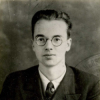Klaus Fuchs

Klaus Fuchs
Emil Julius Klaus Fuchswas a German theoretical physicist and atomic spy who, in 1950, was convicted of supplying information from the American, British, and Canadian Manhattan Project to the Soviet Union during and shortly after the Second World War. While at the Los Alamos National Laboratory, Fuchs was responsible for many significant theoretical calculations relating to the first nuclear weapons, and later, early models of the hydrogen bomb...
NationalityGerman
ProfessionCriminal
Date of Birth29 December 1911
CountryGermany
This is the right signal to give a player a chance for the future.
Afterwards, we will decide if the player fulfils our requirements and whether that is enough for us to sign him.
My argument was that we could not stop Hitler by cooperating with other bourgeois parties but that only a united working class could stop him.
There is nobody I know by name who is concerned with collecting information for the Russian authorities. There are people whom I know by sight whom I trusted with my life.
The last time when I handed over information was in February or March 1949.
I was ready to accept the philosophy that the Party is right and that in the coming struggle you could not permit yourself any doubts after the party had made a decision.
I was in the underground until I left Germany.
I joined the Communist Party because I felt I had to be in some organization.
Before I joined the project most of the English people with whom I had made personal contacts were left wing and affected to some degree or other by the same kind of philosophy.
The Communist Party said that I must finish my studies because after the revolution in Germany people would be required with technical knowledge to take part in the building of the Communist Germany.
I was a student in Germany when Hitler came to power.
At that time I had complete confidence in Russian policy and I believed that the Western Allies deliberately allowed Russia and Germany to fight each other to the death.
I think the one thing that most stands out is that my father always did what he believed to be the right thing to do and he always told us that we had to go our own way even if he disagreed.
I had therefore, no hesitation in giving all the information I had, even though occasionally I tried to concentrate mainly on giving information about the results of my own work.